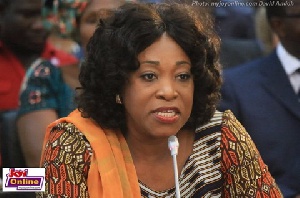 Shirley Ayorkor Botchwey, Minister of Foreign Affairs and Regional Integration
Shirley Ayorkor Botchwey, Minister of Foreign Affairs and Regional Integration
Madam Shirley Ayorkor Botchwey, the Minister of Foreign Affairs and Regional Integration, has said the Government is looking at both internal and external strategies to reform the economy and market its goods and services.
She expressed the belief that the Economic Community of West African States (ECOWAS), with a population of 350 million, could provide that leverage to accomplish its objectives.
‘‘As a nation one of our strategies is to capture the ECOWAS market to sell our goods and services because we cannot just look at the 27 million population of Ghana but look beyond,’’ she said.
Madam Botchwey said this at the opening ceremony of the Economic Trade and Investment Bureau and First Stakeholders’ Conference, organised by the Ministry of Foreign Affairs and Regional Integration on Wednesday.
The two-day event is on the theme: ‘‘The New Dynamics of Economic Diplomacy: Trade, Culture and Tourism Potentials of Ghana’’.
The event brought together heads of department, captains of industry, the diplomatic community, entrepreneurs and business men and women, to deliberate on strategies to enhance trade and investment in the country.
Madam Botchwey reiterated the need for the business community to add value to their export commodities, adding that the Government’s vision of industrialising the nation from consumption to production would fast-track economic development.
‘‘It is sad that most of the cocoa we produce here go out in its raw form, which they use to produce chocolate, chocolate drinks and other finished products and subsequently export them back to us,’’ she said.
Madam Botchwey indicated that Government’s strategy was to add value to the country’s export commodities and trade among the 15 ECOWAS countries as well as take advantage of the continental free trade, saying; ‘‘Ghana must show leadership in that regard’’.
The Government, through the Passport Office, would soon offer a more convenient passport for the business community so that they would not frequent the Office to renew their passports, she said.
Contributing to a panel discussion on the topic: ‘‘Ghana beyond Aid: Recent Trends in the Global Market, National Strategies to address these Challenges,’’ Mr Yoofi Grant, the Chief Executive Officer of the Ghana Investment Promotion Centre (GIPC), said the Government took over an economy that was unstable.
Therefore, he said, before policies could make the desired impact on the economy, there should be some repair work to put it on the right footing.
‘‘When the Government took office in January, this year, the economy was volatile with high interest rate and unstable foreign exchange while the fiscal deficit to the Gross Domestic Product hovered around nine per cent and the debt to GDP at 73 per cent,’’ he said.
The country at that time did not have any fiscal space for development because the Government’s revenues were consumed by the debts accumulated over a long period, with salaries of public and civil servants and statutory payments representing 107 per cent to revenue collection.
Therefore, he said, stabilising the macro-economy was non-negotiable towards making Ghana the hub of investment destination because the economy had witnessed ‘‘boom and bust’’ over the years.
He said the Government’s ambition in the medium term was to become the friendliest nation for doing business in Africa and reposition Ghana as the business hub in the West Africa Sub-region.
Mr Grant noted that the nation could achieve that feat in view of the nation’s stable and impeccable democratic credentials ‘‘and the fact that the nation is located at the centre of the world and, thus, well positioned to facilitate trade in the sub-region.’’
To this end, he said, the country should re-direct her economic strategy and become less dependent on foreign aid and refocus its attention on attracting capital inflow and investment.
The nation must reform its business structures to elevate Ghana from the 108th position on doing business ranking in the world so that investors would be attracted here, he said.
Mr Grant said the Government had begun a significant reform process that involved key Ministries, Departments and Agencies that would set the foundation for achieving its ambitions.
He said the retail sector must be opened up to attract investment adding; ‘‘We must grow Ghana by Ghanaians because it is the partnerships that’s going to grow Ghanaians’’.
He cited the telecommunication and banking sectors that had created wealth for many Ghanaians and, therefore, Government would institute regulatory measures to create wealth for the indigenes.
‘‘The GIPC is undertaking stakeholders consultations so that it understands the issues better, however, we are not going to achieve our objectives if it’s business as usual, but we must be a little bit radical and aggressive in the reform process,’’ he said.